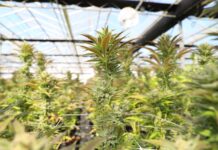June 26, 2018
The US Food and Drug Administration announced Monday June 25, 2018 the approval of the first cannabis based prescription medication. The DEA is expected to change CBD scheduling within 90 days.
The medicine is called Epidiolex and is a plant-derived oral solution of cannabidiol (CBD). CBD is a chemical component of marijuana that does not cause intoxication or a euphoric high. The London based GW Pharmaceuticals plc, is expecting another significant decision where the US Drug Enforcement Administration (DEA) reclassifies CBD.
This could unlock the opportunity to other marijuana-derived medications as well as ease restrictions on other cannabis research.
The FDA approved it for use in patients aged two and older suffering from rare and severe forms of epilepsies known as Lennox-Gastaut syndrome and Dravet syndrome, which can develop early in childhood. This is the first time the FDA has approved a drug to treat Dravet syndrome.
CBD as with other cannabis plant components are classified as Schedule 1 drugs by the DEA. Schedule 1 drugs include heroin and LSD as well as marijuana. They are defined as substances with high abuse potential and “no currently accepted medical use.”
As such, Schedule I drugs are strictly regulated, and use of them including medical use—is against federal law. GW won’t be able to market Epidiolex until the DEA reclassifies CBD.
But the agency is expected to do just that. The FDA noted in its announcement today that it informs and advises the DEA about scheduled substances.
In April, an expert advisory panel for the FDA voted unanimously to recommend Epidiolex’s approval and determined that “CBD has a negligible abuse potential.”
But GW said it expects that the DEA will reschedule CBD within 90 days.
In a statement, GW CEO Justin Gover stated:
Today’s approval of Epidiolex is a historic milestone offering patients and their families the first and only FDA-approved CBD medicine to treat two severe, childhood-onset epilepsies.
These patients deserve and should soon have access to a cannabinoid medicine that has been thoroughly studied in clinical trials, manufactured to assure quality and consistency, and available by prescription under a physician’s care.
Those suffering from severe epilepsy and some researchers have long suspected CBD’s potential to treat the devastating seizure disorders. In some cases, patients have moved to states that have legalized medical marijuana in order to have access to the drug.
“Controlled clinical trials testing the safety and efficacy of a drug, along with careful review through the FDA’s drug approval process, is the most appropriate way to bring marijuana-derived treatments to patients,” FDA Commissioner Scott Gottlieb, said in a statement today.
We’ll continue to support rigorous scientific research on the potential medical uses of marijuana-derived products and work with product developers who are interested in bringing patients safe and effective, high-quality products. But, at the same time, we are prepared to take action when we see the illegal marketing of CBD-containing products with serious, unproven medical claims. Marketing unapproved products, with uncertain dosages and formulations, can keep patients from accessing appropriate, recognized therapies to treat serious and even fatal diseases.
Today’s approval “serves as a reminder that advancing sound development programs that properly evaluate active ingredients contained in marijuana can lead to important medical therapies. And the FDA is committed to this kind of careful scientific research and drug development,” Gottlieb concluded.
Approved
In making the determination to approve Epidiolex, the FDA reviewed data from three high-quality clinical trials showing CBD reduced seizure frequency over placebo in more than 500 patients with one of the two intractable and debilitating forms of epilepsy.
The FDA noted that the most common side effects from Epidiolex were sleepiness, sedation and lethargy, elevated liver enzymes, decreased appetite, diarrhea, rash, fatigue, malaise and weakness, insomnia, sleep disorder and poor quality sleep, and infections.























